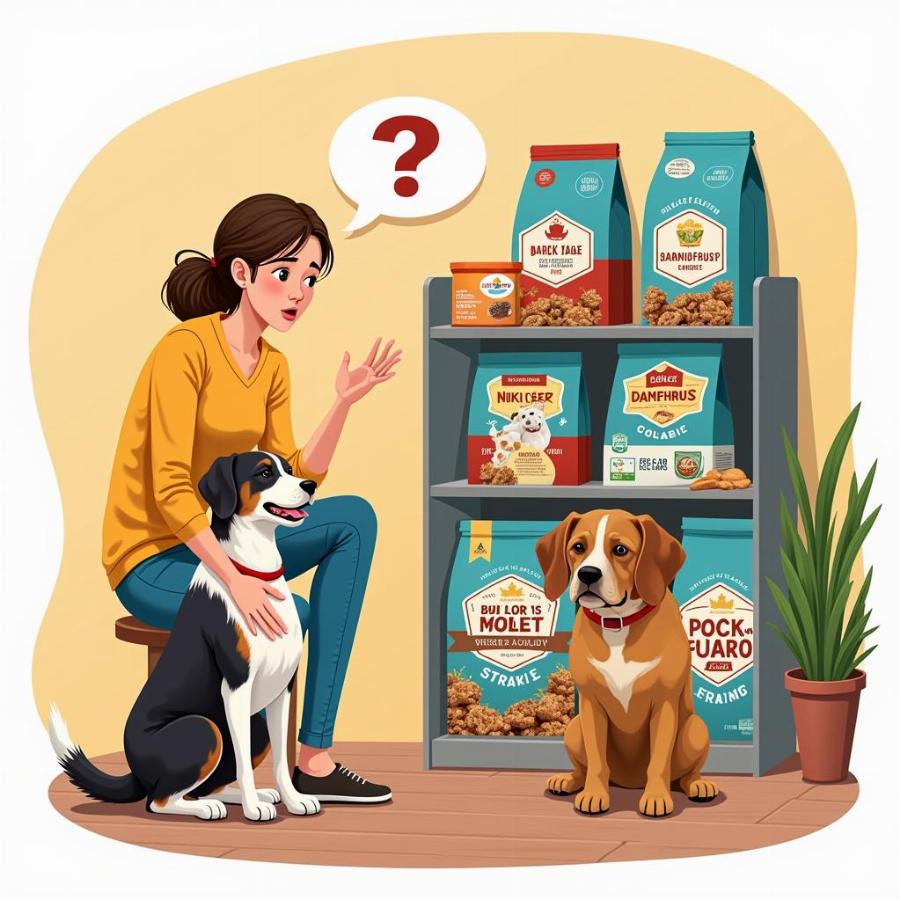Choosing the right senior dog food for sensitive stomach can be a daunting task, but it’s crucial for your furry friend’s well-being. As dogs age, their digestive systems can become more sensitive, making it essential to find a food that’s gentle, nutritious, and palatable. This guide will explore the key factors to consider when selecting senior dog food for sensitive stomachs, offering tips and recommendations to ensure your aging companion enjoys a healthy and comfortable life.
Understanding Sensitive Stomachs in Senior Dogs
As your dog enters their golden years, various factors can contribute to digestive sensitivity. Age-related changes in the gut microbiome, decreased enzyme production, and reduced motility can all make digestion less efficient. These changes can lead to symptoms such as vomiting, diarrhea, gas, and loss of appetite. Choosing the right senior dog food for sensitive stomach can help alleviate these issues.
 Choosing Food for Senior Dogs with Stomach Issues
Choosing Food for Senior Dogs with Stomach Issues
Key Ingredients to Look for and Avoid
When searching for the best senior dog food for sensitive stomach, pay close attention to the ingredient list. Look for foods that feature easily digestible proteins, such as chicken, turkey, or fish. Avoid ingredients known to trigger sensitivities, such as beef, dairy, wheat, and corn. Opt for foods with prebiotics and probiotics to support a healthy gut microbiome and aid in digestion. Fiber sources like sweet potato and pumpkin can also help regulate bowel movements. senior dog sensitive stomach food offers a range of options that fit these criteria.
What are the Best Protein Sources for Senior Dogs with Sensitive Stomachs?
Easily digestible protein sources like chicken, turkey, fish, and lamb are ideal for senior dogs with sensitive stomachs. These proteins are less likely to cause allergic reactions or digestive upset.
Should I Avoid Grains in My Senior Dog’s Food?
While not all grains are bad, some senior dogs with sensitive stomachs may benefit from a grain-free diet. If you suspect a grain allergy, consult your veterinarian before making any dietary changes.
Transitioning to a New Food
Switching your senior dog to a new food should be done gradually to avoid further digestive upset. Start by mixing a small amount of the new food with their current food, gradually increasing the proportion of the new food over several days. This allows their digestive system to adjust to the change. best senior dog food for sensitive stomach provides a helpful guide on transitioning your dog’s food.
Monitoring Your Dog’s Response
Once you’ve transitioned your senior dog to a new food, monitor their response closely. Look for improvements in their digestion, such as reduced vomiting, diarrhea, and gas. Also, observe their appetite, energy levels, and coat condition. If you notice any negative changes, consult your veterinarian.
How Long Does it Take to See Improvement in My Senior Dog’s Digestion?
It can take anywhere from a few days to a couple of weeks to see improvement in your senior dog’s digestion after switching to a new food.
Consulting Your Veterinarian
If your senior dog continues to experience digestive issues despite dietary changes, it’s crucial to consult your veterinarian. They can help identify underlying medical conditions and recommend appropriate treatment options. can you give your dog a cheese stick may offer further insights on what foods to avoid.
Dr. Emily Carter, DVM, a renowned veterinary nutritionist, emphasizes, “A proper diet is fundamental to a senior dog’s health, especially for those with sensitive stomachs. Choosing a high-quality food formulated for their specific needs can significantly improve their quality of life.”
Conclusion
Finding the right senior dog food for sensitive stomach requires careful consideration of ingredients, gradual transitions, and close monitoring. By understanding your dog’s individual needs and working with your veterinarian, you can help your senior companion enjoy their golden years with a happy and healthy tummy. royal canin canned food for dogs might be a good starting point for your research.
FAQ
-
What are the common signs of a sensitive stomach in senior dogs? Common signs include vomiting, diarrhea, gas, loss of appetite, and weight loss.
-
How often should I feed my senior dog with a sensitive stomach? Smaller, more frequent meals can be easier to digest than large meals.
-
Can I give my senior dog homemade food for a sensitive stomach? Consult your veterinarian before switching to homemade food to ensure it meets your dog’s nutritional needs.
-
Are there any supplements that can help with sensitive stomachs in senior dogs? Probiotics and digestive enzymes can be beneficial, but always consult your vet before giving any supplements.
-
What should I do if my senior dog’s sensitive stomach doesn’t improve with a new food? Consult your veterinarian to rule out any underlying medical conditions.
-
How can I make the transition to a new food easier for my senior dog? Mix a small amount of the new food with their old food, gradually increasing the proportion of the new food over several days.
-
Are there any specific brands of senior dog food recommended for sensitive stomachs? Consult with your veterinarian for personalized recommendations based on your dog’s specific needs. canidae dog food reviews might be useful in your research.
Beaut Dogs is your trusted source for expert advice on all things related to dog care, offering valuable insights and guidance for dog owners. For personalized support and detailed answers to your dog care questions, please contact us at Email: [email protected]. We at Beaut Dogs are dedicated to providing you with the information you need to ensure your furry friend lives a long, healthy, and happy life. Visit us at https://beautdogs.com today!